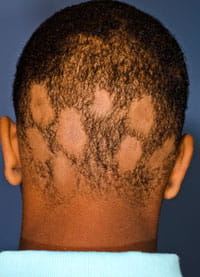What is Alopecia Areata?
Alopecia areata is a condition where a person has hair loss as a result of the immune system attacking the hair follicles.
Alopecia areata is a condition where a person has hair loss as a result of the immune system attacking the hair follicles.
 We do not know why Aaopecia areata happens. Often, the hair loss only involves a few patches that are round in shape. Hair loss is usually seen on the scalp, face and / or body, but is most common on the scalp. Sometimes it can be more extensive.
We do not know why Aaopecia areata happens. Often, the hair loss only involves a few patches that are round in shape. Hair loss is usually seen on the scalp, face and / or body, but is most common on the scalp. Sometimes it can be more extensive.
Over 6 million people in the United States have alopecia. It affects both males and females, people of all ethnic backgrounds and can occur at any age. It is only rarely seen with other autoimmune diseases in children. Alopecia areata often happens once and then there is regrowth of normal hair. Sometimes, hair loss followed by periods of re-growth may happen again and again. This may happen over many years.
For limited areas of alopecia, the affected hairs shed and new hair may regrow. No treatment is usually needed as 95% of the time the hair will regrow.
Your doctor may prescribe a few medications to try to help the hair to grow. However, there is no good evidence that any of these treatments will guarantee the hair will regrow.
These may include:
Follow the instructions for use very carefully. If the skin gets irritated, or if you have any questions, please call your doctor.
There is little evidence that use of oral medicines will produce lasting hair regrowth, and the side effects of these medicines usually outweigh any potential benefit.
Hair may or may not regrow. Hair that is trying to regrow may respond to treatment and continue to regrow. There is little evidence that hair that is not trying or able to regrow can be “made” to regrow by the use of medicines or other treatment.
If you are interested in wigs or hairpieces, you may wish to contact Locks of Love. They provide affordable, sometimes free, hairpieces for children with alopecia.
Visit the National Alopecia Areata Foundation for support groups and general information.
We provide specialized care for patients with a wide range of skin, hair and nail disorders, from acne to warts.
Last Updated 12/2024
Learn more about our editorial policy.